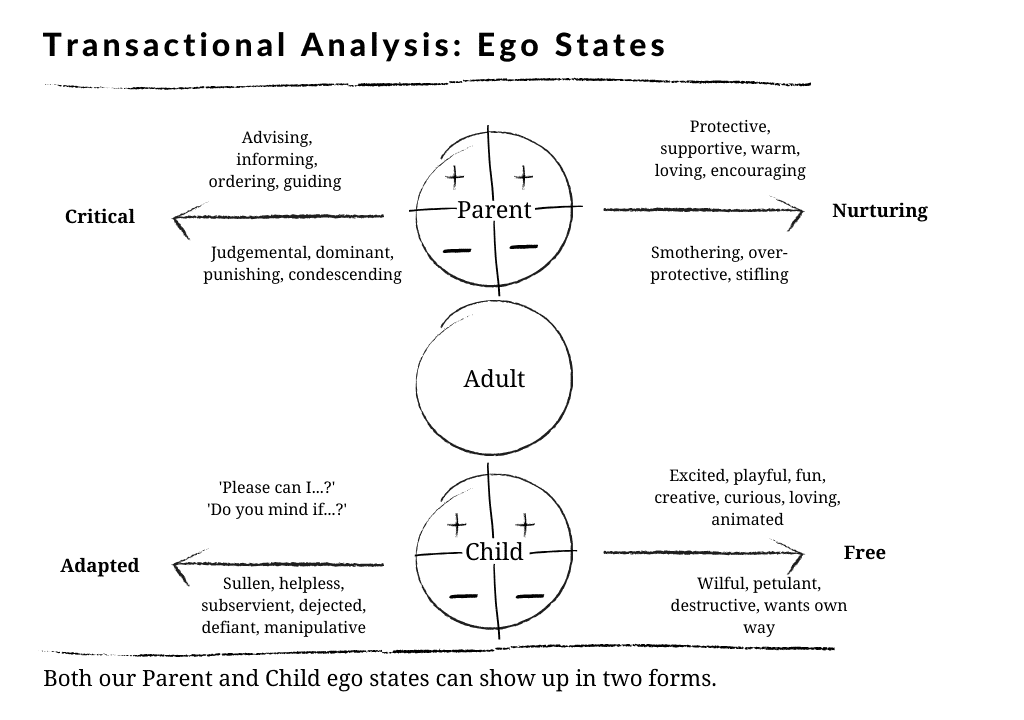Switching Roles: The Psychology of How Others Can Make You Feel Like a Parent, Adult, or Child
Transactional Analysis in the Workplace: Enhancing Communication, Leadership, and Personal Growth

Is there a person in your life, who, every time you talk to them you end up feeling a bit like a child? You feel stupid and your mind goes blank. All your knowledge and experience seems to disappear in a puff of smoke in the presence of this person.
Have you ever got into an argument with someone and thought, “here we go again!”
Is there a person in your life who constantly asks for help and advice, and when you offer something, they reject it?
These situations are difficult to make sense of because they only happen with certain people in certain situations, not with everyone or all the time. The ‘problem,’ isn’t inside of you, it is specific to that particular interaction.
Back in the 1960s, psychoanalyst Eric Berne set out to investigate this phenomena and came up with his theory of Transactional Analysis or TA (Berne, 1964). His ideas elegantly explain the above situations. It’s useful to have a working knowledge of TA in the workplace. It will help you:
Manage conflict
Build a culture of psychological safety
Give and receive feedback
Empower employees
Avoid being pushed around
Manage the help rejecting complainer
Berne said that when we are talking to another person, both you and the other person will be in one of three ego states:
Parent Ego State
The Parent Ego State is a group of thoughts and feelings that you’ve learnt from your parents or other authority figures. When you are in a Parent Ego State you feel a bit like a parent and relate to the other person in a parenting manner. The Parent Ego State (like the other two ego states) can have two subcategories. You can be a nurturing parent, being protective, caring and supportive or a nurturing parent who is smothering, overprotective and stifling.
You can also be a critical parent that is either guiding, advising, or instructing the other person (in a good way) or a negative, judgemental, domineering, punishing, withholding or condescending critical parent.
Adult Ego State
When you’re in an Adult Ego State you are just responding normally to the situation. This is the ego state to aspire to. The Adult Ego State differs from the other two in that it does not have any subcategories. This state operates in the present, without being influenced by past conditioning. A person in the Adult Ego State tends to be more receptive, reasonable, and less likely to jump to negative conclusions about a situation or person.
When individuals communicate in the Adult Ego State , they are more likely to be considerate, willing to compromise, actively listen to others, and enjoy healthier social interactions.
Child Ego State
When you are in a Child Ego State you are re-enacting thoughts, feelings and often behaviours you experienced as a child. A bit like the Parent Ego State, the Child Ego State is made up of two subcategories. Berne called these the ‘free child,’ and the ‘adapted child.’
The free child can be excited, playful, creative, curious, loving and full of life. It can also be negative being wilful, petulant, destructive and selfish.The other Child Ego State is the ‘adapted child,’ which can be polite, if a bit submissive but also sulky, sullen, subservient, defiant or manipulative.
Now, pause for a moment here and think about the times that you’ve experienced any of the above ego states – when you felt particularly nurturing or protective of another person – either at work or in your personal life. Perhaps you’ve experienced a Child Ego State and felt really enthusiastic about something – like an excited child or, maybe you felt sullen, sulky and resentful when you’ve been asked to do something you don’t want to do. Or, maybe you’ve noticed these behaviours in other people? You may even have had a conversation with somebody that was really interesting, straightforward, and satisfying; it felt like two adults exchanging views – a peer-to-peer dialogue. That would be you and the other person both in an Adult Ego State .
The other interesting thing about TA is that ego states tend to elicit reciprocal roles. In other words, if someone starts speaking to you in a Parent Ego State, it is likely to trigger your own Child Ego State . Similarly, if someone is in a Child Ego State when talking to you, it will trigger your Parent Ego State. Sometimes, this can be helpful. If you’re excited about an idea and you ask a more experienced and knowledgeable person about this idea, you might be in the free Child Ego State and trigger the nurturing Adult Ego State in the other person.
But, it doesn’t always happen like this. If you’re in the free Child Ego State and excited about an idea, this might trigger the critical Parent Ego State in the other person who immediately becomes judgemental, condescending or withholding. Problems start to arise when negative parent or child ego states get triggered. Eric Berne said that problems can also arise when ego states get out of sync with each other.
Here’s how to make use of this idea in your day-to-day life.
When you feel like a child...
If you are talking to someone and you find yourself feeling like a child, that’s because the other person is in critical parent mode. The thing to do is to recognise this and quickly shift your ego state back to an Adult Ego State . Do this by calmly and tactfully calling out the person's patronising behaviour.
Here we go again…
If you find yourself getting into an argument that you had time and time before, it’s probably because either the other person or you have out of sync ego states. Again, do your best to shift into an Adult Ego State and point out the process of the conversation rather than the content, “it’s interesting that we’ve had this argument before and we’re just going over old ground – I wonder what’s happening?”
That won’t work, and I’ve already tried that…
If someone asks for your help or advice and when you give it, they immediately reject it. You are in a Parent Ego State and they are in a needy Child Ego State . Try to shift into an Adult Ego State by asking them what options they can come up with to solve the problem; rather than immediately jumping in with a solution (as a parent might do for a young child). Remember, the person standing in front of you is a competent adult. This will help them to also shift from Child Ego State to Adult Ego State .
TA can be helpful when handling conflict in the workplace. Most conflict results from negative ego states triggering each other (critical parent to petulant child) or crossed interactions (critical parent to adult). The solution is to try and get both parties back into Adult Ego State .
By recognising the different ego states and their variations, you can communicate more effectively and avoid misunderstandings or conflict.
For example, a manager who communicates with an employee in a Nurturing Parent Ego State might come across as caring and supportive, whereas communicating in a Critical Parent Ego State would be more controlling and negative.
TA can also be used to identify and address unproductive or dysfunctional behaviour patterns, such as passive-aggressiveness or a victim mentality. By recognising these patterns and understanding their underlying causes, you can develop strategies to change your behaviour and improve your relationships with others.
So the next time you are in a difficult situation, think about how you feel. Do you feel that you are being pushed into solving someone else's problems (parent ego)? Are you in a meeting surrounded by intimidating people (child ego)?
Think about what might trigger you into a parent or Child Ego State . Get back into adult ego and make rational, balanced decisions in a mature and healthy way.
References and further reading:
Berne, E. (1964) Games People Play: The Psychology of Human Relationships. Grove Press, New York.



Interesting insight - even for a non professional